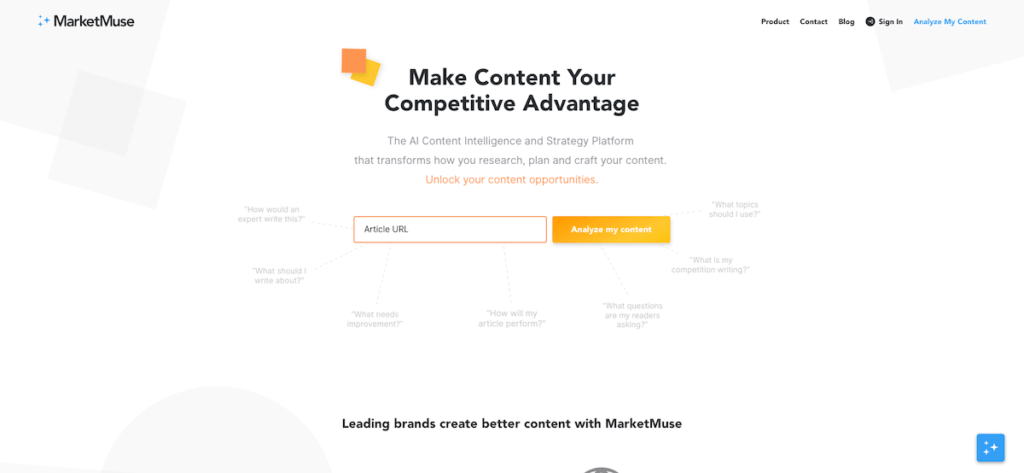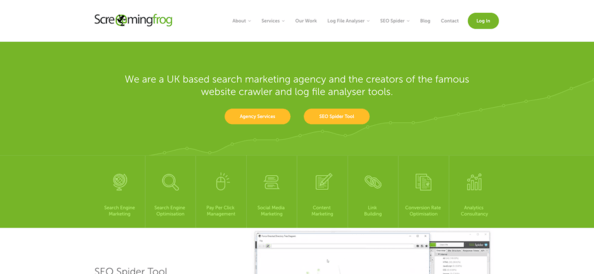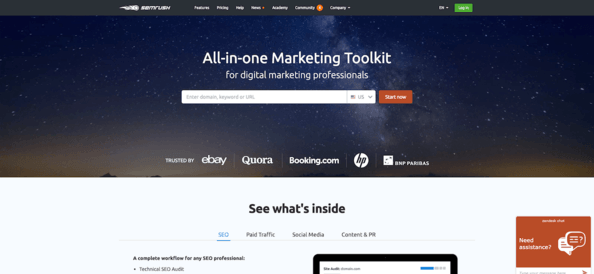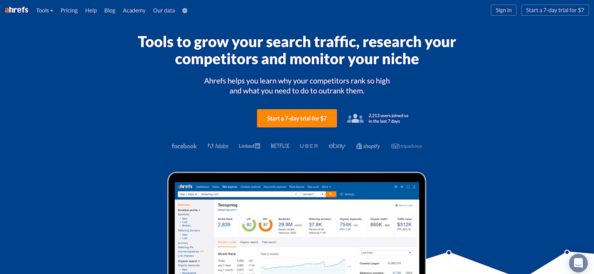Do You Need a Site Content Analyzer? The Answer is Yes, and Here’s Why
No matter how big your content marketing team, no matter how much (or how little) content you already have, you need a way to analyze your content. Without a site content analyzer tool, you’re really flying blind when it comes to content creation.
Now, there are a lot of different site content analyzers out there. Some are free; some cost money. Some tackle an entire site and all aspects of its content; some analyze just a few elements.
To determine which tool will help you reach your content goals, it’s essential to understand what’s available.
What Is a Site Content Analyzer?
The term “site content analyzer software” covers a wide range of tools. The kind you choose depends on your content marketing goals and the stage of your content creation process.
Broadly speaking, content analysis tools fall into one (or more) of these categories:

Analytics Analysis
These tools give you a high-level look at how your content is doing. They track page and keyword ranking, time on page, scroll depth, page views, audience demographics and several other helpful analytics that indicate which pieces are performing for and which aren’t.
What they don’t do is tell you why they’re performing the way they are. For that, you’ll need to do some theorizing and a/b testing, or you can upgrade to a more advanced semantic tool.
Keyword and Topic Analysis
This kind of tool is mainly used before you start writing, during your keyword and topic planning phase. You can use these tools to research keywords and topics you’d like to target, see how they perform and determine if there are better keywords and subjects to cover.
Backend Content Analysis
A backend tool will look at your metadata, backlinks, images and HTML tags. Search engines use that information to understand what your content is about. It’s also one of the many pieces they use to determine if your content is worthy of a high SERP ranking.
Semantic Analysis
A semantic tool takes your general content analysis tool a step further. With it, you can figure out how to improve content that isn’t performing well.
Content optimization tools will analyze your topics, subtopics, keywords and the actual content of your piece. It will determine if you’re missing subtopics that would improve your topic authority. It will determine if your content matches the search intent of your keywords.
You’ll start to get a better picture of how thorough your content should be.
This kind of tool will also look at several pieces of content across a topic. It will recommend new material to fill in gaps and how you can create topic clusters that will improve your topic authority, as well.
The Swiss Army Knife
A Swiss army knife type of tool will do all of the above. You can use it to audit, plan, create, publish and track all of your content. It’s an end-to-end solution for brands with a robust content marketing plan.
How Can a Site Content Analyzer Tool Help?
There are three ways in which a site content analyzer tool can give you an edge with your content:
- It can analyze your existing content to tell you which pieces are performing best, which need improvement and which you should put out to pasture.
- It can analyze your competitor’s content to tell you which pieces are performing best for them and on what topics you can one-up them.
- It can analyze trending topics and keywords to help you construct new content that will perform well in search and social.
We’ve already talked about how you can use analyzer tools for auditing and planning your own content, so let’s talk about how you can use them to conduct a competitor analysis.
Your competitor’s content is right out there for everyone to see, right? So why not crawl it using an analysis tool, just like you would your own?
You can use it to understand which of their topics and pieces are doing well and which are not.
Even with their winning pieces, analyze them for topic and subtopic gaps. Then, create content that covers those gaps to rank better.
If, through your analysis, you see that they dominate on a particular topic with a few pieces. Take that information and create a cluster that covers the subject more fully.
And of course, if they have content that isn’t doing well, that’s low-hanging fruit. Write a better, more robust piece, or series of articles using your analysis tool to ensure a better SERP ranking.
Who Needs Site Content Analyzer Software?
The honest answer? Everyone needs a site content analysis tool. But the type of software you choose will depend on the size of your budget and where you are in your content marketing journey.
If you have no content yet, and you’re just beginning your content marketing journey, you may need more of a keyword and topic analysis tool to help you plan. If you already have a library of content, an auditing and semantic analysis tool can provide a good picture of your content offering and how to improve it. If you need to make sure everything is on the up and up on the technical side, look into a backend analysis tool.
If you need all of the above, look into a Swiss army knife tool.
Below, I discuss some examples of all of these content analyzer tools to help you determine what you need.
What Are Some Content Analysis Tools on the Market?
MarketMuse

MarketMuse is a Swiss army knife type of analysis tool that explicitly targets your content for analysis and improvement. It takes you through every step of the content planning, execution and tracking process to ensure you’re creating the best-performing content for your brand.
Audit existing content for keywords, topics, subtopics, and content gaps. Plan your content using its keyword and topic analysis tools, create content briefs that help writers create high-ranking content, and then track your content to ensure it performs as it should.
You can even compare your content against that of your competitors.
Screaming Frog

The Screaming Frog software is a backend analysis tool. Using Screaming Frog, you can crawl your entire content library to look for things like bad links, incorrect or missing metadata, or mis-tagged content.
For SEO and content strategy, they have a human team that works with clients to improve existing content and create new content that will help them rank.
Content Insight

Content Insight is a content inventory tool that falls under the general content analysis category. The tool gives you a big-picture view of all of your content, images, titles, and media. It also integrates analytics on each piece.
Google Analytics (GA)
GA is a comprehensive content analysis tool. You can collect all the analytics I mentioned at the beginning of this article, but it’s a little handier than that. You can set time frames to analyze content over days, weeks and even years. You can compare the content’s performance year over year or month over month.
You can look at entire verticals on your site or individual pieces. You can even look at content by topic to understand how a particular keyword or topic is performing.
SEMRush

This is a set of nifty analytics, keyword and backend analysis tools that lets you compare the performance of your site and content against that of your competitors. You can also take a look at how your competitors are using their display ads and compare your social media rankings against theirs, as well.
Moz

Moz is an analytics, backend and keyword and topic analysis tool. They have their own set of analytics that they’ve built and cultivated since 2004. They were the inventor of the SERP ranking that can help you understand how your content will rank on search engines.
They also track your SERP ranking so you can get a better handle on how people are finding your content.
Ahrefs

This is a powerful backend tool. It will analyze and give you visuals on your content’s health in terms of HTML tags, backlinks, external links, images, etc. It will help you tighten up all of those technical elements search engines use to categorize your content.
Last Thoughts
Do you need to analyze your content? The answer is an unequivocal yes. If you continue to churn out content without understanding what’s performing for you and what isn’t, your entire content effort will likely fail. And if you don’t keep tabs on what your competitors are doing, it’s going to be really hard to beat them at the content game.
Take a look at the content analyzer tools out there. Take a look at your own content plan and goals and then find the tool that will help you best.
What you should do now
When you’re ready… here are 3 ways we can help you publish better content, faster:
- Book time with MarketMuse Schedule a live demo with one of our strategists to see how MarketMuse can help your team reach their content goals.
- If you’d like to learn how to create better content faster, visit our blog. It’s full of resources to help scale content.
- If you know another marketer who’d enjoy reading this page, share it with them via email, LinkedIn, Twitter, or Facebook.
Laurie is a freelance writer, editor, and content consultant and adjunct professor at Fisher College. Her work includes the development and execution of content strategies for B2B and B2C companies, including marketing and audience research, content calendar creation, hiring and managing writers and editors, and SEO optimization. You can connect with her on Twitter or LinkedIn.